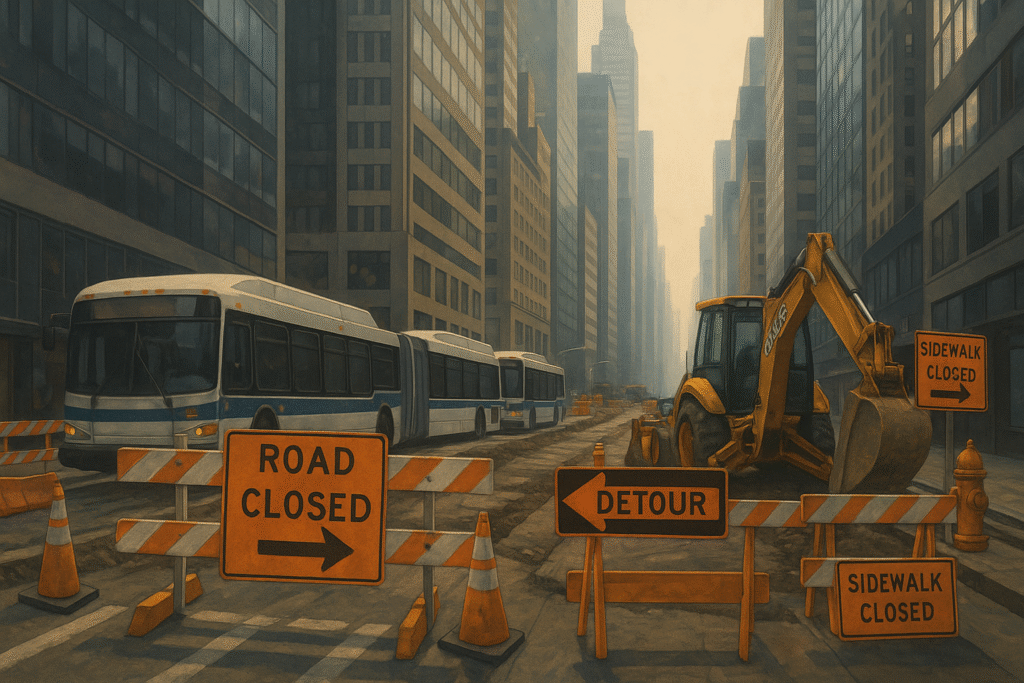In a move that underscores growing friction between federal authorities and New York City, the Federal Transportation Administration (FTA) has requested the Federal Highway Administration (FHWA) to temporarily suspend work on the long-anticipated 34th Street Busway Project in Midtown Manhattan pending a comprehensive review of its design and environmental impact.
A Sudden Pause in a Key Transit Project
The order, issued late Friday, caught many city planners and transit advocates by surprise. The project, intended to create a dedicated bus corridor across 34th Street between Hudson Yards and the East River, was a cornerstone of the city’s broader strategy to reduce traffic congestion and improve public transit reliability.
The FTA cited the need for a “federal compliance and environmental reassessment” as the main reason for the halt. However, the timing of the intervention — coming after months of construction progress and community consultations — has led to speculation of political and jurisdictional tensions between Washington and City Hall.
“We are reviewing the scope of work to ensure compliance with all federal transportation and safety guidelines,” said an FTA spokesperson. “Our priority is to ensure that every federally supported project aligns with national standards for urban mobility and sustainability.”
City Officials Push Back
New York City’s Department of Transportation (NYC DOT) expressed disappointment, emphasizing that the project had already passed multiple local reviews and had broad public support.
“The 34th Street Busway is not just an infrastructure project — it’s a lifeline for thousands of daily commuters,” said NYC DOT Commissioner Ydanis Rodriguez. “Every day of delay means more congestion, longer travel times, and higher emissions in Midtown.”
City officials warned that halting the project could disrupt bus service improvements along one of the city’s busiest transit corridors, affecting routes M34 and M34A-SBS, which serve tens of thousands of passengers daily.
A Broader Struggle Over Urban Autonomy
The federal order has reignited debate over how much control local governments should have in implementing transportation solutions. Analysts suggest that this dispute reflects a larger philosophical clash between local innovation and federal oversight.
“This is about who gets to decide what urban mobility looks like — the city or Washington,” said transportation policy expert Dr. Carla Monroe. “New York has long been a testing ground for transit innovation, and this decision could set a precedent for other cities.”
Public and Political Reaction
Transit advocacy groups, including Transportation Alternatives and the Riders Alliance, condemned the halt, calling it a setback to climate goals and equity-focused urban planning. On social media, the hashtag #Save34thBusway began trending within hours, with commuters sharing frustration about stalled progress on improving bus speeds and reliability.
Meanwhile, some Midtown business owners expressed mixed reactions — while a few welcomed reduced street disruptions during the pause, others worried about the long-term economic cost of delaying the project.
What’s Next
According to the FTA, the review process could take between 60 and 90 days, after which federal and city officials will decide whether construction can resume or if modifications are required.
Despite the uncertainty, New York officials vowed to continue advocating for the project.
“We’ll keep pushing forward,” Commissioner Rodriguez stated. “New Yorkers deserve faster, cleaner, and more efficient transportation — and we won’t stop working to make that happen.”
As federal inspectors prepare to re-examine the blueprints, the halted 34th Street Busway stands as both a symbol of bureaucratic gridlock and a test case for the balance of power between local autonomy and federal control in shaping the future of America’s urban infrastructure.



